Not surprising and yet dramatic: This is how the most comprehensive meta-analysis to date on corona learning deficits in school children can be summarized, which is now in the journal Nature Human Behaviour has appeared. According to the study, students lost 35 percent of the learning progress of a normal school year during the pandemic overall and across several countries. Those most affected by the deficits are those who come from poorer families or grow up in poorer countries. The gap between children and young people from different economic backgrounds has widened during the pandemic, as has the gap between different countries.
For the analysis, 42 studies from 15 countries published between March 2020 and May 2022 were used. Most of the data comes from richer countries such as Great Britain, the USA, Switzerland and Germany. The results of middle-income countries such as Brazil or Mexico show even greater learning deficits. Data from countries with a low average income are missing, which the authors around Bastian Betthäuser from the research laboratory for global inequality CRIS in Paris also point out. After all, according to the UN, more than 1.6 billion children and young people in 190 countries were affected by school closures during the pandemic – the educational problem of the “Corona Generation” is therefore likely to be significantly greater from a global perspective.
The deficits are greater in mathematics than in reading
The learning deficits identified in the meta-analysis are greater in mathematics than in reading, which the authors explain with the fact that many parents were probably better able to practice reading with their children than mathematics at home. No significant differences in the size of the backlogs were found across grade levels, with deficits in basic knowledge among school entrants likely to have particularly serious implications for the future.
Education experts agree that the gaps that have arisen will not disappear on their own, but will accumulate over time without countermeasures and will likely further increase educational inequality. “The sooner you can take countermeasures, the better it is,” says school teacher Klaus Zierer from the University of Augsburg. He recommends thinking about a wide variety of solutions such as summer schools, but also about clever digital concepts. At the same time, Zierer warns: “What has often happened – putting tablets in the hands of learners and hoping that they will have a positive effect – must be regarded as a failure.”
In Germany, educational researchers also point out that many challenges in schools have not only existed since Corona, but have to do with changes in society as a whole, such as greater diversity in the student body or the growing shortage of teachers. In addition to short-term catch-up concepts, fundamental reforms are therefore necessary. “It is important to see that many of the problems that are now becoming apparent in schools would also have to be addressed without a pandemic. It is good that the connection between the social background of students is now being re-emerged as an issue in the educational policy debate more present,” says educational researcher Benjamin Fauth from the Baden-Württemberg Institute for Educational Analysis.
Especially since one area that is also directly related to learning success and a good school time was not taken into account at all in the meta-analysis: the negative effects of the pandemic on the psychosocial development and physical condition of children and adolescents.
With material from the Science Media Center (SMC).

